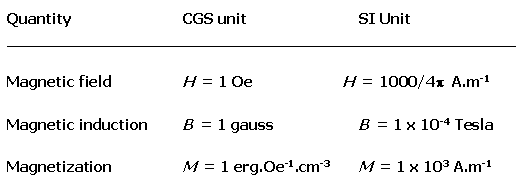Quantifying Magnetic Properties
After reading this section you will be able to do the following:
- Explain the quantities and units used to describe magnetic fields and magnetic properties.
- Convert between CGS and SI units.
Magnetic Field Strength, Flux Density, Total Flux and Magnetization
Until now, only the qualitative features of the magnetic field have been discussed. However, it is necessary to be able to measure and express quantitatively the various characteristics of magnetism. Unfortunately, a number of unit conventions are used (as shown in the table below). SI units will be used in this material. The advantage of using SI units is that they are traceable back to an agreed set of four base units - meter, kilogram, second, and Ampere.
| Quantity |
SI Units
(Sommerfeld) |
SI Units
(Kennelly) |
CGS Units
(Gaussian) |
|
| Field | H |
A/m
|
A/m
|
oersteds
|
| Flux Density (Magnetic Induction) |
B |
tesla
|
tesla
|
gauss
|
| Flux | f |
weber
|
weber
|
maxwell
|
| Magnetization | M |
A/m
|
-
|
erg/Oe-cm 3
|

The units for magnetic field strength (H) are ampere/meter. A magnetic field strength of 1 ampere/meter is produced at the center of a single circular conductor with a one meter diameter carrying a steady current of 1 ampere.
The number of magnetic lines of force cutting through a plane of a given area at a right angle is known as the magnetic flux density (B). The flux density or magnetic induction has the tesla as its unit. One tesla is equal to 1 Newton/(A/m). From these units, it can be seen that the flux density is a measure of the force applied to a particle by the magnetic field. The Gauss is the CGS unit for flux density and is commonly used by US industry. One gauss represents one line of flux passing through one square centimeter of air oriented 90 degrees to the flux flow.
The total number of lines of magnetic force in a material is called magnetic flux (f). The strength of the flux is determined by the number of magnetic domains that are aligned within a material. The total flux is simply the flux density applied over an area. Flux carries the unit of a weber, which is simply a tesla- meter2.
The magnetization is a measure of the extent to which an object is magnetized. It is a measure of the magnetic dipole moment per unit volume of the object. Magnetization carries the same units as a magnetic field: amperes/meter.
Conversion between CGS and SI magnetic units.

Review:
- It is necessary to be able to measure and express quantitatively the various characteristics of magnetism.
- The units for magnetic field strength (H) are ampere/meter.
- The number of magnetic lines of force cutting through a plane of a given area at a right angle is known as the magnetic flux density (B).
- The total number of lines of magnetic force in a material is called magnetic flux (f).